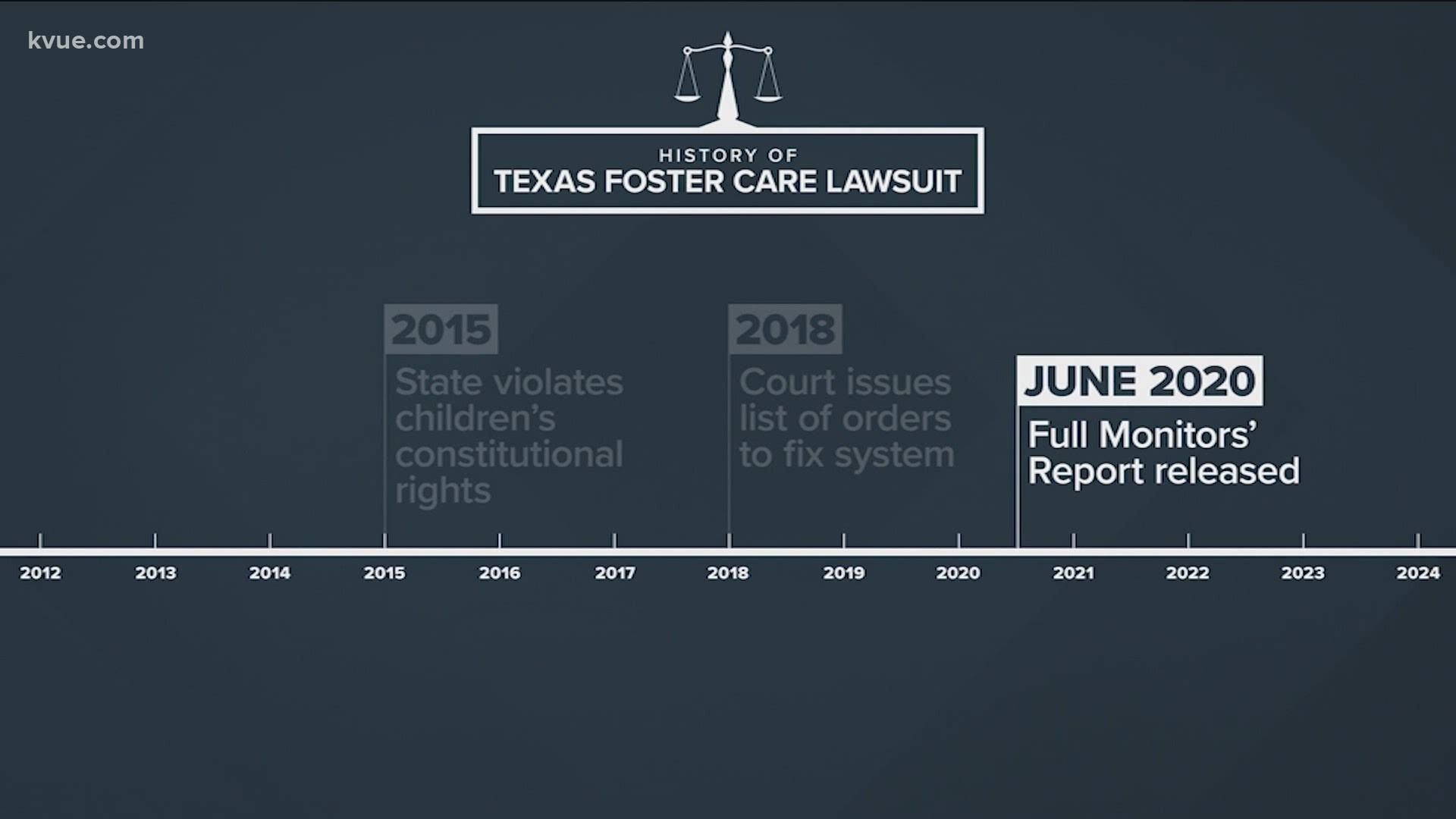AUSTIN, Texas — Over the years, childcare advocates have scrutinized the systemic issues within the Texas foster care system. State leaders involved with the system have passed legislation and created or updated policies in hopes of creating a safer environment for the children in long-term state care.
However, in June, independent monitors hired by the Court, which is overseeing the lawsuit against the State, released a report pointing out the enduring systemic issues the State is still facing, which is putting kids at a "significant risk" for abuse and neglect.
The Texas Association for the Protection of Children, or TexProtects, has followed these developments.
Despite the State's efforts to implement the orders of the court, the Monitors' findings suggest the State needs to "radically shift the way we provide care for children who have been victims of abuse and neglect," according to a statement from the organization.
However, they feel the primary efforts should focus on keeping kids at home with their families in safe environments.
Kerrie Judice, TexProtects CPS research and policy analyst, noted multiple points from the report that stick out to her team. For one, starting from the initial filing of a report, current DFPS policies, practices and procedures are causing cases of child maltreatment to go uninvestigated, the report found.
The Statewide Intake (SWI) is a resource people can use to submit reports, however, 18% of the calls go abandoned, the report stated. If a call was taken, reports were inappropriately downgraded, merged with an open case, or screened out.
"Cases were usually reviewed for minimum standards for violations and licensed foster care placements, instead of investigating for abuse or neglect," Judice said.
As of April 2020, the report also noted investigators for Child Protective Services (CPS) had 500 backlogged cases. About 32% of high priority cases went untouched for at least 24 hours. This meant children whose cases had not been reviewed would sit in potentially unsafe conditions.
If a child is in need of assistance, caseworkers are there to help. However, historically speaking, these workers have suffered from high caseloads beyond what the Court deems manageable, leading to untimely responses and mistakes, Judice said. This is still the case, according to the report.
These issues are furthered by the lack of communication in the system, making it difficult for caseworkers to keep up with their children.
At times, caseworkers are not even notified if a report is filed about a child on their caseload. Judice believed this is concerning because it can lead to untimely responses and mistakes.
"I felt like we were looking at similar findings of what we had, where there was an unreasonable risk of harm two years ago. Here we [are] again two years later," Judice said.
The monitors also flagged the current IT infrastructure between the two agencies assigned to creating a safe environment for children, the Department of Family and Protective Services (DFPS) and the Health and Human and Services Commission (HHSC), stating they do not communicate well together.
"This lack of cohesiveness causes issues when trying to track critical information such as investigation histories which can make it difficult to identify the history of maltreatment," Judice said.
TexProtects also addressed these points:
- The State’s lack of oversight of child placements is placing children at risk of harm: "[Residential Child Care Licensing] rarely revoke licenses and often continue to place children in placements with histories that show clear patterns of concerns, leading the Special Monitors to uncover many stories, including child fatalities," according to their statement.
- Many children do not know who to contact if they need to make a complaint while in foster care, and if they do, access to a telephone is limited or supervised, making it difficult for them to express their concerns.
After the report came out, the State, including Gov. Greg Abbott, Commissioner Courtney Phillips (HHSC) and Commissioner Jaime Master (DFPS) filed objections with the report.
RELATED: Gov. Abbott, state agencies object to report painting dangerous picture of Texas foster care system
In part, the leaders stated they have made strides to improve, many of which went unreported by the monitors. They also were faulted for issues that were not required to address per the Court's remedial orders issued in 2018.
"I don't want to say they haven't made strides. I think it shows there is just still a lot of work to do. We can't ignore what the special monitors have uncovered here," Judice said.
Judice was optimistic that with new leadership in place, including a new DFPS commissioner, positive changes are on the horizon.
MORE FOSTER CARE COVERAGE:

